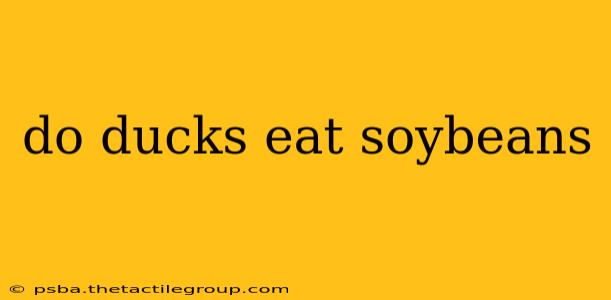Do Ducks Eat Soybeans? A Deep Dive into Duck Nutrition and Soybean Consumption
Mallards paddling through a soybean field, domestic ducks gobbling up spilled beans—the image might seem unusual, but the question of whether ducks eat soybeans is more complex than a simple yes or no. While not a staple food in the wild, soybeans can certainly form part of a duck's diet, both wild and domesticated, under specific circumstances. Let's explore this fascinating topic in detail.
Wild Ducks and Soybean Fields: An Accidental Feast?
In their natural habitat, wild ducks are opportunistic omnivores. Their diet consists primarily of aquatic plants, insects, small fish, and seeds. Soybeans, while not a typical part of their natural diet, are often found in agricultural areas. If a duck happens upon a soybean field, particularly after harvest when spilled beans are abundant, they'll likely consume them. However, this is more of an accidental encounter than a deliberate dietary choice. Their foraging instincts would lead them to readily available food sources, and soybeans, offering some nutritional value, fit the bill. The quantity consumed would depend on the availability of other preferred food sources.
Domestic Ducks and Soybean Meal: A Deliberate Dietary Inclusion?
For domesticated ducks raised for meat or egg production, the story changes. Soybeans, often in the form of soybean meal (a byproduct of soybean oil extraction), are frequently included in commercially produced duck feed. This is because soybean meal is a cost-effective and relatively high-protein source. Protein is crucial for duck growth, egg production, and overall health. However, the inclusion of soybeans in commercial feed is carefully controlled to ensure a balanced diet, preventing nutritional deficiencies or imbalances. Too much soybean meal, on the other hand, can lead to issues.
Nutritional Considerations: The Soybean Advantage and Potential Drawbacks
Soybeans offer several nutritional benefits for ducks:
- High Protein: Essential for growth and development.
- Amino Acids: Soybeans contain various essential amino acids crucial for various bodily functions.
- Fiber: Provides digestive support.
However, overreliance on soybeans can also lead to problems:
- Enzyme Inhibitors: Raw soybeans contain enzyme inhibitors that can interfere with digestion and nutrient absorption. This is why processing is crucial before inclusion in duck feed.
- Phytates: These can bind to minerals, reducing their bioavailability.
- Goitrogens: Certain compounds in soybeans can interfere with thyroid function if consumed in excessive quantities.
Therefore, a balanced diet is key. Soybeans should be a part of a diverse diet that includes other essential nutrients and isn't the sole source of protein.
Conclusion: A Nuanced Answer
So, do ducks eat soybeans? The answer depends on the context:
- Wild ducks: They might consume soybeans if available, but it's not a preferred or primary food source.
- Domestic ducks: Soybeans, usually in processed forms like soybean meal, are frequently incorporated into their commercially produced feed as a cost-effective protein source, but careful formulation is crucial for optimal health.
In short, while soybeans can be a part of a duck's diet, moderation and balanced nutrition are essential for their well-being.

